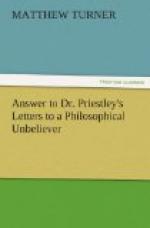other Doctor can put his name boldly to a book in favour
of Theism, loudly call the supporters of a contrary
doctrine to the argument, and if no answer is produced,
assert their own reasoning to be unanswerable.
In that sense their sort of reasoning has been frequently
unanswerable. Here however is an instance of
a poor unknown individual, making experience of the
candour of the ecclesiastics and the equity of the
laws of England, for he ventures to subscribe his publication
with his name as well as Dr. Priestley does his Letters,
to which this publication is an answer. Perhaps
he may have cause to repent of his hardiness, but
if he has, he is equally resolved to glory in his
martyrdom, as to suffer it. Whatever advantage
religion has had in the enumeration of it’s
martyrs, the cause of atheism may boast the same.
As to the instances of the professors of any particular
form of religion, or modification of that form, such
as Christians or sects of Christians, suffering martyrdom
for their belief, I shall no more allow them to be
martyrs for theism than Pagans similarly suffering
for their belief, shall I call martyrs for atheism.
Theism very likely has had it’s martyrs.
I can instance one I think in Socrates, and I shall
mention Vanini as a martyr for atheism. The conduct
of those two great men in their last moments may be
worth attending to. The variety of other poor
heretical wretches, who have been immolated at the
shrine of absurdity for all the possible errors of
human credence, let them have their legendary fame.
I put them out of the scale in this important inquiry.
Not that I really think the argument to be much advanced
by naming the great supporters of one opinion or of
another. In mathematics, mechanics, natural philosophy,
in literature, taste, and politics the sentiments
of great men of great genius are certainly of weight.
There are some subjects capable of demonstration,
many indeed which the ingenuity of one man can go
farther to illustrate than that of another. The
force of high authority is greater in the three former
sciences than in the latter. Theism and Atheism
I hold to be neither of them strictly demonstrable.
You, Dr. Priestley, agree with me in that. Still
I hold the question capable of being illustrated by
argument, and I should hold the authority of great
men’s names to be of more weight in this subject,
were I not necessarily forced to consider that all
education is strongly calculated to support the idea
of a Deity; by this education prejudice is introduced,
and prejudice is nothing else than a corruption of
the understanding. Certain principles, call them,
if you please, data, must be agreed upon before any
reasoning can take place. Disputants must at
least agree in the ideas which they annex to the language
they use. But when prejudice has made a stand,
argumentation is set at so wide a distance, through
a want of fixt data to proceed upon, that attention
is in vain applied to the dispute. Besides, the




